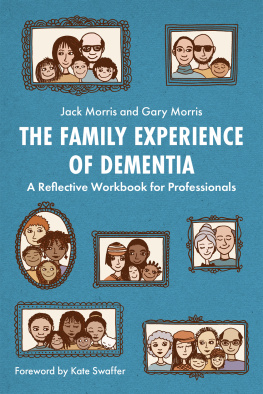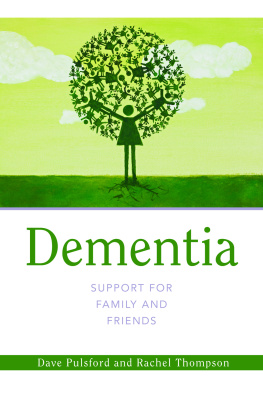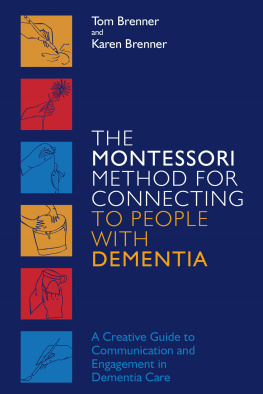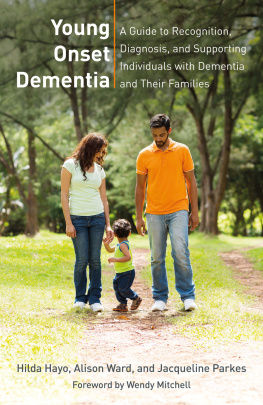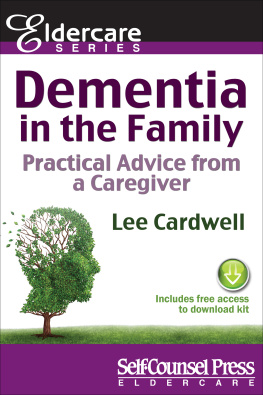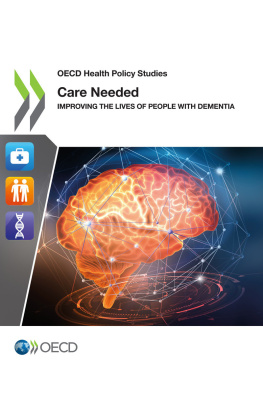Contents

The Family
Experience of
Dementia
A Reflective Workbook
for Professionals
JACK MORRIS and GARY MORRIS
Foreword by Kate Swaffer

Contents
Foreword
It was with some trepidation I read this book, in particular because it says I have inspired the authors. Although this is gratifying, it definitely adds some pressure to my past work and writings, and also to my theories on what it is really like living with a diagnosis of dementia.
This book offers a series of narratives from people who themselves are diagnosed with dementia, and from many others including care partners and families of people living with dementia. It challenges some of the negative narrative and thinking about us and provides me with hope.
The only people who can truly describe what it is like living with dementia are those of us who are diagnosed with it. Families, care partners, children and others who support and live alongside us have their own unique but separate journeys. This book explores the multi-varied experiences involved in living with and alongside dementia. It provides readers with positive messages and learnings connected with these experiences.
As I was quoted saying in 2012, There is a gross underestimation of the capacities of all people with dementia, and I believe this book will help everyone to understand this to be true. As a workbook for professionals, this is an essential outcome.
Living beyond dementia, a term I have been using for almost a decade, quickly describes that people diagnosed with dementia do not simply need to go home and prepare to die. With disability support, and a major change in attitudes towards and about us, we can live meaningful and productive lives. It does not mean we were misdiagnosed, nor does it mean dementia is not a terminal illness. It does however mean we are still people, and we are very much still here and if we ignore the Prescribed Disengagement, which is all we are offered at the time of diagnosis and after, we can live a more positive life than once thought. We may be changing, but we are just changing in ways that people without dementia are not.
Hence, although when I was first diagnosed with dementia I wrote about my disappearing world, I did not disappear; that world has gone due to the loss of identity due primarily to losing my job, and to the pervasive stigma and discrimination, but my life is still full of meaning and achievements.
This workbook will help you all see the person, not the dementia, and will inspire you to change your attitude, your practice, and most of all, I hope it will inspire you to support people with dementia to live positively with their diagnosis, for as long as possible, rather than only support them to go home and wait to die from it.
Kate Swaffer, MSc, BPsych, BA, retired nurse,
author, poet, disability activist and Humanitarian Chair,
CEO and Co-Founder of Dementia Alliance International
Website and blog: https://kateswaffer.com/daily-blog
Copyright Acknowledgements
Ten early symptoms of dementia list on is reproduced with kind permission of Alzheimers Disease International.
is reproduced with kind permission of Tim Morris.
Three levels of dementia impact list (Prince et al . 2015) on is reproduced with kind permission of Alzheimers Disease International.
is reproduced with kind permission of Daisy Morris.
Action plan list on is reproduced with kind permission of World Health Organization.
Core elements of self list (Bryden 2018) on is reproduced with kind permission of Alzheimer Caf UK.
Key elements relating to dementia cafs list (Greenwood et al . 2017) on is reproduced with kind permission of BMC Geriatric.
Group singing list (Clift et al . 2008) on is reproduced with kind permission of Sidney De Haan Research Centre.
Remember to Dance list (Vella-Burrows and Wilson 2016) on is reproduced with kind permission of Sidney De Haan Research Centre.
Promoting visual comfort and orientation list (McNair, Cunningham and Pollock 2010) on is reproduced with kind permission of Dementia Services Development Centre.
Introduction
It has been a number of years since we the authors have collaborated on exploring and expressing our observations around the lived experience of those affected by dementia and associated care approaches (Morris and Morris 2010). It has been heartening to note within the intervening years further developments in public awareness, impacted by timely campaigns and governmental policies. The communal campaigns embrace a wide variety of communicative platforms including social media and seek to promote a collective cognisance with messages of optimism and a lessening of stigma.
This book builds upon the significant theme of the lived experience for people with dementia, their families, friends and significant others. It is in essence family-centred, acknowledging the experience that each family member undergoes when one family member is presented with a dementia diagnosis. For the purposes of this perspective, we introduce the readers to the Lawrence family. Each chapter takes the reader on a different part of this familys dementia journey. Their experiences are introduced through narratives that are assimilated through our examination of published sources and first-person accounts embracing lived experience. This work therefore adopts a person-centred approach reflecting the concept of personhood as developed by Tom Kitwood (1997) and the Bradford Dementia Group. Our chosen family places this work predominantly within the experience of young-onset dementia and the impact upon those regarded as being in their mid-life. This provides a distinct focus concerning the 42,000 people diagnosed within the UK at younger ages (Alzheimers Society 2019) who may well still be in employment or related areas of productivity, with families (including school age children) and active social leisure lives. Whilst this forms the predominant perspective it is intended for the reflected themes to be applicable to wider groups. This is not exclusive and we will also look at other defining characteristics including older age adults, same-sex partnerships and varying cultural groups.
Dementia (definition and statistics)
Dementia is an overall term for diseases and conditions characterized by a decline in memory, language, problem-solving and other thinking skills that affect a persons ability to perform everyday activities (Dementia Statistics Hub 2017). There are over 200 sub-types of dementia, but the five most common are: Alzheimers disease, vascular dementia, dementia with Lewy bodies, fronto-temporal dementia and mixed dementia (Dementia UK 2019). The reader should become cognisant with other causes of dementia such as posterior cortical atrophy, Creutzfeldt-Jakob disease, dementias associated with Parkinsons disease, HIV/AIDS and alcoholism. Downs syndrome is the most common genetic cause of learning difficulties and individuals with this condition represent the largest group of people with dementia under the age of 50 years. However, cognitive assessment is challenging and diagnostic methods have not been fully validated for use with these patients and therefore early diagnosis remains difficult (Ballard et al . 2016).
It is estimated that worldwide approximately 50 million people have dementia with nearly 10 million being newly diagnosed each year. These numbers are estimated to increase to 152 million in 2050, a 204 per cent increase (World Health Organization 2017). In the UK there are 850,000 people with dementia with numbers set to rise to over 1 million by 2025 and 2 million by 2051. These figures account for over 42,000 people under the age of 65 and 25,000 people from black, Asian and minority ethnic (BAME) groups (Alzheimers Society 2019). The projected increase in figures shows a continuation of a trend seen over the past few decades. From 2005/06 to 2016/17 the number of people on the dementia register rose from:

